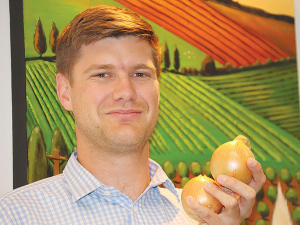Damien O’Connor: NZ united on global trade
When it comes to international trade, politicians from all sides of the aisle are united, says Labour's trade spokesman Damien O'Connor.
 Onions NZ chief executive James Kuperus says NZ growers will be getting an extra $3 million this season for exports to the EU thanks to the early ratification of the FTA.
Onions NZ chief executive James Kuperus says NZ growers will be getting an extra $3 million this season for exports to the EU thanks to the early ratification of the FTA.
NZ onion growers are getting an extra $3 million this season for exports to the European Union, thanks to the early ratification of a free trade agreement (FTA).
An earlier entry into force will also see tariff savings of $43 million for NZ kiwifruit exporters, on top of the $3 million for onion exporters this season.
The European Union FTA Legislation Amendment Bill received Royal Assent two weeks ago, completing the process for New Zealand’s ratification of the deal with the largest trading bloc in the world.
Trade and Agriculture Minister Todd McClay says all parties involved in the committee process agreed to complete the legislative process by the end of March.
“This will mean the agreement can enter into force on the first day of the second month, 1 May, instead of July or August, which would have excluded much of this year’s kiwifruit and onion exports.”
Onions NZ chief executive James Kuperus says it is great news for New Zealand onion growers, coming in time for the last half of the export season.
“The EU is New Zealand’s largest export onion market. We estimate that about 35,000 tonnes would be exported to the EU, tariff free, post 1 May. This volume would be worth an extra $3m or so, thanks to the early removal of the 9.6% tariff,” Kuperus says.
He points out that New Zealand onion growers are having a better season this year.
“Quality is exceptionally good. This season’s onions will keep well and maintain their great taste.”
Most of the 2024 crop has now been harvested and stored with exceptional quality. Favourable weather conditions throughout the growth and harvesting stages have instilled confidence among growers regarding the quality, quantity, and storage capabilities of this year’s crop, notes Kuperus.
Export operations have already commenced, with shipments bound for European and North Asian markets, and plans in place for exports to Indonesia soon.
Kuperus says the resilience displayed by New Zealand’s farmers reflects their determination to overcome challenges.
However, costs are continuing to increase – especially around labour.
Kuperus says there are obviously sea freight issues, thanks to conflicts around the globe.
“The industry is working around these challenges but now it has had access to Indonesia re-confirmed, growers are focused on finishing the season on a high.”
Kuperus says the industry thanks government ministers and officials for their tireless efforts, with the EU and in Indonesia, in particular.
“It’s great to have the government’s help to open doors, deal with issues and pursue negotiations, most of which take years to conclude.”
Fonterra’s impending exit from the Australian dairy industry is a major event but the story doesn’t change too much for farmers.
Expect greater collaboration between Massey University’s school of Agriculture and Environment and Ireland’s leading agriculture university, the University College of Dublin (UCD), in the future.
A partnership between Torere Macadamias Ltd and the Riddet Institute aims to unlock value from macadamia nuts while growing the next generation of Māori agribusiness researchers.
A new partnership between Dairy Women’s Network (DWN) and NZAgbiz aims to make evidence-based calf rearing practices accessible to all farm teams.
Despite some trying circumstances recently, the cherry season looks set to emerge on top of things.
Changed logos on shirts otherwise it will be business as usual when Fonterra’s consumer and related businesses are expected to change hands next month.